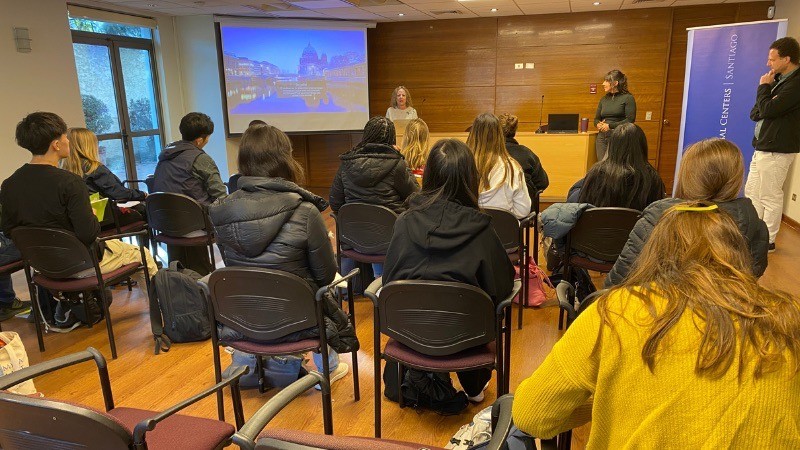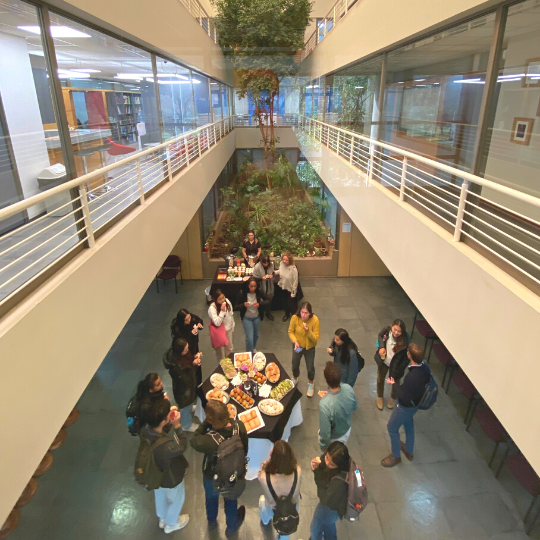Environmentally Conscious High School Students Visit Chile, Argentina with Columbia Climate School
The group of 14 is the inaugural cohort of the Columbia Climate Corps Chile & Argentina Program.

A group of 14 ecologically driven high school students with a significant interest in how to address climate change visited the Santiago Center towards the end of July as part of the inaugural Columbia Climate Corps Chile & Argentina Program.
During their time at the Santiago Center, the students learned about the Columbia Global Centers’ reach and mission, and about the Santiago Center’s focus in particular to bring climate issues to the fore.
That was followed by a presentation by the Chilean trip coordinator Antonia Samur (SIPA’18), an associate at Columbia’s National Center for Disaster Preparedness, which performs research and policy analysis in system readiness, disaster recovery, citizen engagement, and vulnerable populations. She explained that disaster science is an intersection between hard sciences and social science, reviewing where policies can be improved to better prepare for, respond to, and recover from disaster while reducing risk.
She defined risk as natural hazards, multiplied by exposure created by society, multiplied by vulnerability (determined by socio-economic factors), divided by capacity (also determined by socio-economic factors).
Samur also reviewed the various dimensions of vulnerability: economic (housing quality, access to services such as transportation, insurance, and finance); social (networks, community institutions); health (chronic disease, medical dependence, special mobility needs); and environmental (pollution, exposure to natural hazards).

She was followed by Nicolas Maennling, principal advisor for the Andean Region at the German Agency for International Cooperation (GIZ), an expert in sustainable mineral resource management, and a researcher at Columbia’s Center for Sustainable Investment (CCSI). He reviewed the positive and negative impacts of mining, how the decision is made where to mine, and how to balance and redistribute those positive and negative sector impacts.
He reviewed CCSI’s five-pillar framework for responsible mining: legal framework, planning and revenue management, economic and infrastructure linkages, integrated development and human rights, and managing environmental impacts.
The high school students were extremely inquisitive, asking many questions and participating in conversations regarding the mining industry’s impact on Chile’s economic and environmental landscape throughout the presentations. On behalf of the Columbia Climate School, the students were joined by Laurel Zaima-Sheehy, Program Manager of non-degree programs from the Lamont-Doherty Earth Observatory (LDEO).

The trip
The program for these environmentally minded high school students was developed by the Columbia Climate School, seeking to help them understand the environmental challenges and solutions of the lithium industry through field learning experiences in Chile and Argentina.
The three-week trip (July 22 - August 11) began in Chile’s capital, Santiago, after which the group was slated to visit the Hydrographic and Oceanographic Service of the Chilean Navy (SHOA) in Chile’s coastal city of Valparaíso, to learn about climate disaster risk reduction strategies.
Students then headed north to visit the Atacama Desert to learn about the region’s the mining history, the impacts of desertification and water management challenges for local communities, while also discussing issues of human rights and gender equality in the mining sector.
Students will then enter the Argentinian Andes and meet with small communities to learn how climate change is impacting their regions. They will hike across unique geological formations and explore the biodiversity of Calilegua National Park, in the province of Jujuy, where they will learn about conservation of wild lands and ecological zones. The trip will end in the province of Salta, where students will conclude their final projects.